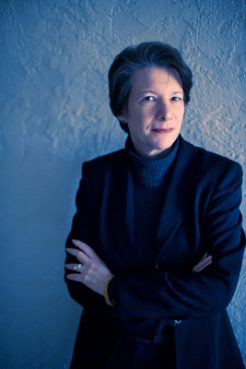
(RNS1-JAN03) Amy-Jill Levine is a New Testament scholar at Vanderbilt University Divinity
School and a self-described “Yankee Jewish feminist.” See RNS-10-MINUTES, transmitted Jan.
3, 2007. Religion News Service photo courtesy HarperSanFrancisco.
(UNDATED) Best-selling author Robert Wright has done a lot of reading recently: the Hebrew Bible, the New Testament, and the Quran. And although the former Southern Baptist did not rediscover his faith, he did retrieve a Big Idea: that God, as depicted in each sacred text, “evolves” from more belligerent and vengeful to compassionate, tolerant and “moral.”
In his latest book, “The Evolution of God,” Wright contends that this divine maturation has a worldly cause: deities mellowed as their biographers — the writers of the various holy books — encountered social environments that rewarded cooperation over aggression.
Across 567 remarkably lively pages, Wright argues that our current globalized, highly interdependent culture may well produce versions of Christianity, Islam and Judaism that worship a less prickly and more empathetic God than ever before.
Some answers have been edited for length and clarity.
Q: Your book treats its title character primarily as a human construct, which might appeal to one of the `new atheists.’ Yet it seems to channel Rick Warren when it talks about the universe’s “higher purpose.” So who should be more offended, Warren or Richard Dawkins?
A: I try to be an equal opportunity offender, although I do think there’s also something for both religious people and atheists to like.
Q: You suggest that in the case of each faith, God depicted in Scripture “grows.” Can you give an example?
A: Monotheism — the belief that there is just one God — emerged among the Israelites around the time of their conquest by Babylon and exile there. The resulting God has a retributive attitude: he gleefully anticipates the coming punishment of nations who have persecuted Israel. But after the Exile, when Israel became part of the Persian empire and its neighbors were no longer enemies, Jewish Scripture described a more inclusive and compassionate God.
Q: So when their context became more favorable, their God became more tolerant. You call that a “non-zero-sum” situation. What does that mean?
A: A zero-sum relationship, like a game of chess, means that you must lose for me to win. Non-zero-sum describes situations where we both win if we play our cards right.
Non-zero-sum situations multiply as societies become more interdependent. I argue that Christianity really developed the doctrine of love as it became part of the Roman Empire, whose regions were highly interdependent. And Islam became more tolerant to keep its own empire harmonious.
Q: So social change determines the nature of God? Won’t that bother the true believers?
A: Yeah, I think the primary motivating forces are economic, political and technological, with religion responding. But that doesn’t mean there is no divine purpose unfolding, because the purpose could be unfolding through the material world. It could be built into the universe.
Q: You write of “salvation” as a social goal, not a personal aim. That doesn’t sound very Southern Baptist.
A: I’m not a Southern Baptist anymore. But salvation always had two dimensions for me. One was eternal life; but it also had to do with living a life worthy of salvation. I think of the universe as having a moral axis, and moving yourself closer to it is a kind of salvation, although obviously not as glamorous as spending eternity in heaven.
Q: Unlike the new atheists, you unabashedly suggest that “there is a point to it all — a higher purpose” that may be godly.
A: I think that evolution — both biological and cultural — can argue for a divine purpose. Both exhibit not just direction, but eventually a moral direction, a natural tendency to move toward moral truth. I’d call that evidence for a higher purpose, if not proof.
Q: Each monotheistic religion claims exclusive possession of the truth. But you say that for the world to survive, monotheistic faiths will have to give up their “specialness.” Is that possible?
A: Saying one possesses the unique path to salvation creates potentially deadly friction. Is it possible for them to maintain distinct identities while letting go of some of that specialness? Yes, there’s a history of religions making those adaptations. Would it be a tragedy if their identities became less distinct? No.
So long as religion makes people better I don’t think it matters — and I don’t think God would think it matters — whether the religions come under several brands or one.
Q: You’ve recently said that President Obama’s Cairo speech to the Muslim world was “broadly consistent” with the ideas in your book. How so?
A: That speech indicated respect for Islam as a faith and — through its critique of Israeli West Bank settlements — recognized Muslims’ sense of real-world embattlement. It showed sophistication about how religion works.
George Bush called Islam “a religion of peace,” but one got the sense that he wasn’t totally sure. Obama seems less captive to the idea that religions have some kind of eternal character. He understands that the mood of a religion grows out of facts on the ground and a perception of others’ attitude toward it. Right now that’s a particularly useful recognition.




